“We were walking another friend home to his condo after having a few drinks at Cubao X, when we saw this ancient-looking tree somewhere along P. Tuazon [Boulevard in Quezon City],” recounted Jayvee del Rosario. “We joked, ‘what if a spirit appeared when we took this photo?’”
The candid-looking photograph spotlights his friend Reuben backdropped by the urban legend-famous balete tree. Its distinct combination of flash, grainy texture, and sharpness a few megapixels could produce would make you think that it’s resurfaced by the Facebook Memories feature, swimming somewhere in an album of that social media platform in the early 2010s—a time when people would just vomit all their new pictures directly online and tag their friends, sans today’s knee-jerk curation and post-processing. (Yup, it’s not a fever dream. It happened.)

Photo by Jayvee del Rosario
But the truth is, it’s actually taken by a Gen Z. “Unfortunately, we actually spooked ourselves bad and ran away from the tree. Well, you can see the photo now and there’s no spirit naman,” Jayvee, a recent juris doctor graduate from University of the Philippines Diliman, further narrated.
The camera used—a point-and-shoot Canon PowerShot S95—is released in 2010, though. “It was marketed to pros when it first came out, but it’s also fun to shoot casually! It has a cool pop-up flash. I got this from Carousell for around P2,000,” he said.
Entering the keyword “digicam” on that site would yield tons of results in 2023—many of them are posted two weeks, a day, or even three hours ago; some cameras are wrapped in “Sour”-like Y2K stickers or placed beside Sonny Angels, today’s emotional support toy. Various Instagram shops also boast a wide roster of these point-and-shoot gadgets, many of them already sold despite being recently uploaded.
Like Jayvee, graphic designer Elly Cua owns a digicam she brings “everywhere,” such as travels, random walks, and even for documenting events like gigs. In fact, she has had a long history with the gadget through the years, in the form of her family’s Pentax Optio M50, an obscure Che-ez from her dad, a light pink Sony W510, and a Samsung WB100, which she later on handed to her boyfriend in 2019.
Before she started using her current go-to (a Fujifilm Finepix XP80), the Makati-based creative would rely on an old Olympus Tough TG-620, born in 2012. “I bought this because it’s perfect for gigs with super humid venues and super energetic crowds. It’s also a capable camera for travel; I can take photos if I swim. I added a charm given by my partner, a sticker of my illustration, and a small souvenir sticker from Taiwan that was given by a college friend. [Unfortunately], this camera got broken from a beach trip.”
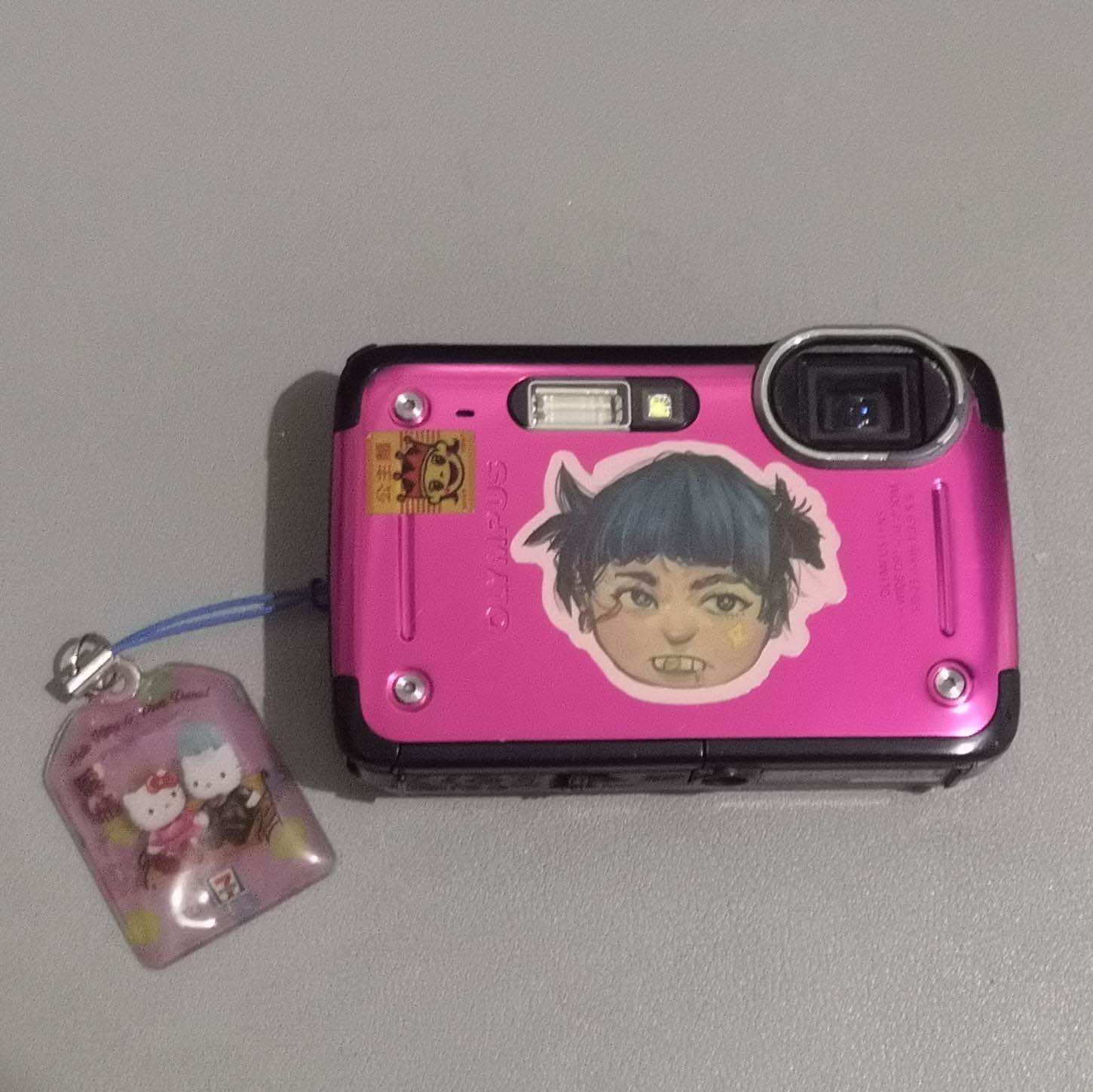
Elly’s Olympus Tough TG-620
We’ve been witnessing Gen Zs’ penchant for the early aughts’ stylebook—and moreover its pop culture—in recent years, but seeing particularly these unassuming, compact cameras resurrect during main hangout spots or monthly dumps of people my age feels almost like a fever dream.
And it’s not only the 2000s point-and-shoot digicams that are making a comeback. Even old school camcorders have snuck its way to the young folks’ hearts, just by carrying its retro-like quality, unpredictability, and overall perfectly imperfect charm. For a device that I often only see during family-related events (our own Sony Handycam houses many graduations and New Year’s Eves), it’s interesting to notice it that has gained the TikTok generation’s seal of approval—even if it would sometimes take an ounce of curiosity and bravery in taking risks.
One example is Joaquin Daza Dimayuga, who got dibs on his first camcorder in 2017, thanks to a Facebook bulk sale. “[It had] four point-and-shoot film cameras and the one camcorder for, like, P500. None of the point-and-shoots worked, but luckily I was able to get the camcorder up and running with some help from one of the camera shops in Hidalgo.”
View this post on Instagram
Now, he mostly uses a JVC VHS-C camcorder. “I think it’s from the early ’90s. I sometimes also use my MiniDV camcorder,” says the 25-year-old video editor. One of the memories that got immortalized by his camcorder was a US trip with his family. “My parents also let me travel solo to L.A. where I stayed with a friend. It was cool to meet some distant family members and to hear their stories. I was convinced I would turn this footage into a short film but I never finished it.”
Nineteen-year-old Emilia Evangelista shoots in film—something she began doing at 13—but she also got to document a chunk of her high school life through her trusty Sony DCR camcorder. “Back in 2019, when I was a freshman in high school, I would bring a teeny tiny camcorder everyday and record everything. When the pandemic happened, I rewatched all of the videos I had taken and decided to compile all the videos. This is the sweet memory it created… It’s so funny looking back now,” reveals the UP Diliman fine arts freshman.
“It’s not that these Gen Zers are longing to return to childhood, but that they are finding and expressing their values through their technological choices,” says Fast Company. Photography website PetaPixel also says that for this generation, “a photo taken with a digital camera captures everything in a scene with precise detail and makes it look more ‘real.’”
American news channel Scripps News also highlights how Quentin Ventura a.k.a. Bruh With A Camcorder has seen a rise in invites from businesses who want to work with him. “Anybody can create things with your iPhone and all these other different devices, but I feel like when you really have a cassette or a tape that you can play back and be like, ‘Hey look, this is true to that time,'” he said.
Overwhelming mobile phone models and high-end cameras reign the Zoomers age—with the promise of quickness and accessibility—but why are they skipping timelines for memory-hoarding? Why do they choose gadgets with a more outdated image and video quality and much more limited features from their parents’ (or older siblings’) eras?
We continue our chat with Gen Zs Jayvee, Elly, Joaquin, and Emilia to dissect their relationship with documentation and being chronically online, while scrolling through their unique gallery of core memories.
Jayvee, 24
Our generation has tons of options when it comes to taking pictures and videos. With the latest models of cameras and phones, everything can be instant and high-quality. But what made you backtrack and shift to this gadget?
Several factors influenced me to shoot with digicams. First is getting sick of my phone. Everything is on our phones nowadays and it’s honestly just so distracting to use a phone when you’re out taking photos.
Second is definitely Y2K revival (laughs)—but, I think, Y2K is heading out and 2010 Tumblr indie sleaze is stepping in. Digicams still fit the vibe though. Third is seeing my photojournalist friend Geela Garcia (shoutout po) shoot with one. She lowkey influenced our friend group to get into digicams.
Last is the price of film! I used to shoot in 35mm more, but a roll today is just so expensive on top of costs of developing.
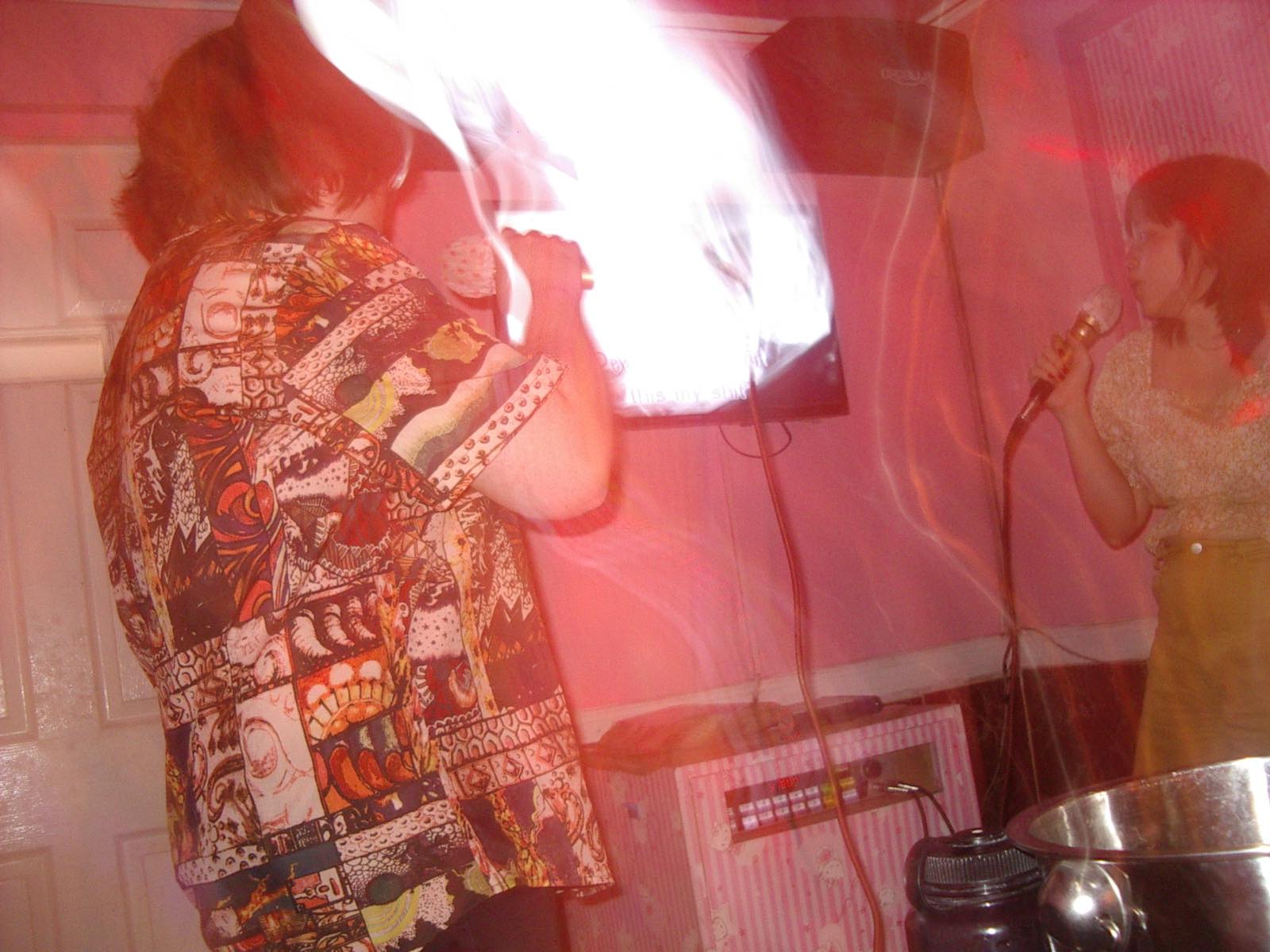
A photo Jayvee took during a “Hello Kitty karaoke” using a Pentax Optio 330 GS. “This was taken at my friend Yuri’s birthday salubong at a Hello Kitty-themed karaoke in Poblacion. I love how my digicam captured the lights on this one.”
What do you love most about using this gadget?
True to their namesake, digicams encourage me to just point and shoot.
In contrast to always-connected smartphones, digicams let you focus on capturing memories. Not to mention, they’re more ergonomic considering their dedicated shutter button and physical dials. Some even have viewfinders if you want to forgo using a screen altogether. Also, the flash on a digicam, or any dedicated camera for that matter, is often far more powerful than what you would find on smartphones.
In contrast to modern cameras, you have [to] accept the imperfections that come with taking photos and videos with digicams.
Since digicams use older hardware, they retain more noise, blurring, and artifacting than modern cameras. I think that gives photos more character and often results in happy surprises. This also translates in videos which have an “old home movie” vibe.
It’s similar to film and, in fact, many photographers say they shoot with digicams to achieve a “film-like” look, minus the cost. I agree to an extent, but it’s not totally the same. Digicams as a medium can stand on their own. Take a look at digicam photos for yourself and there really is a unique, ineffable quality to them.
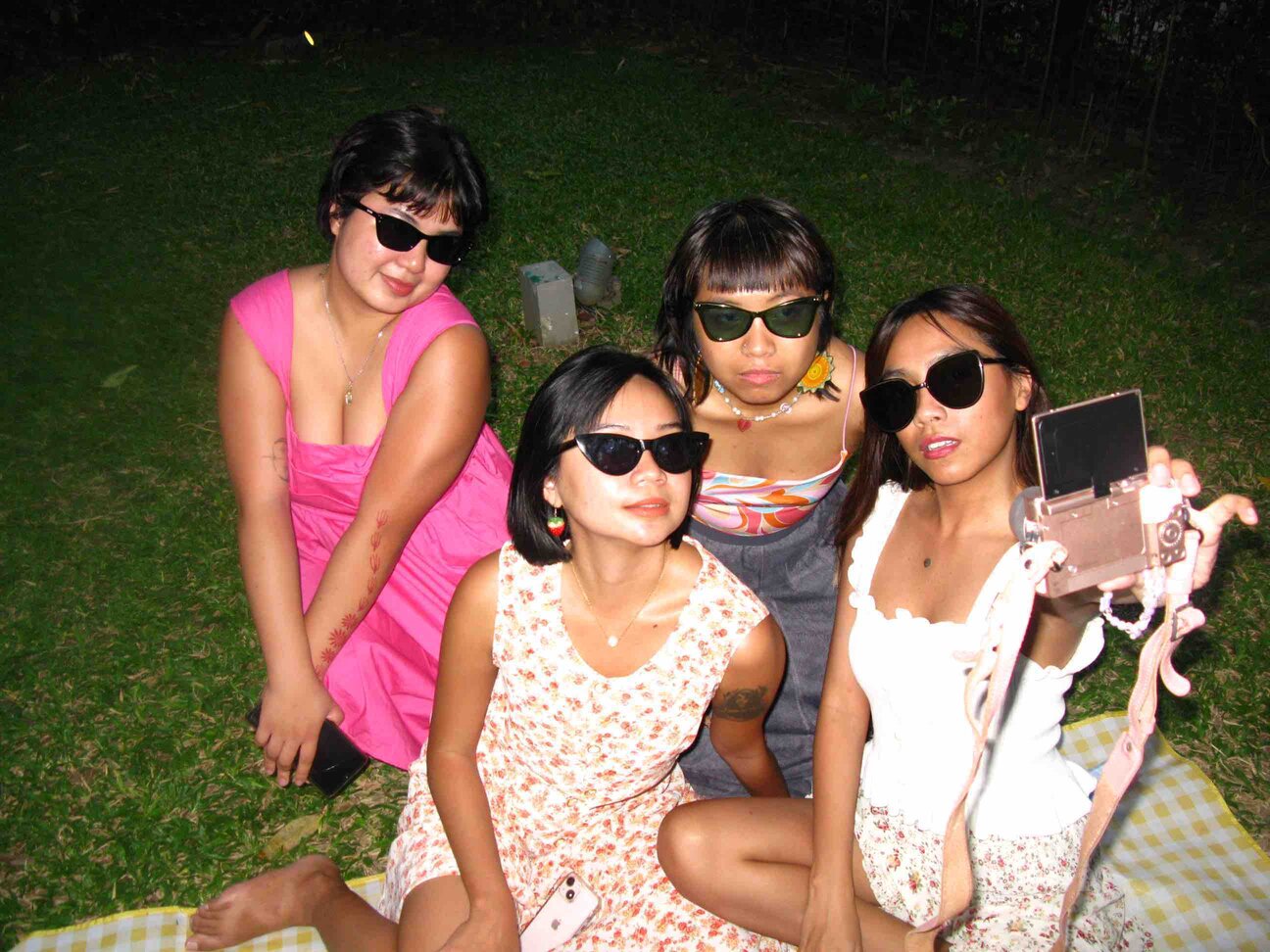
Another photo Jayvee took while hanging out with friends. “[This is] Pat Kay’s birthday picnic in Washington SyCip Park. I noticed my friends were taking a selfie with a mirrorless so I took a behind-scenes-shot with my digicam. We thought the photo looked very indie sleaze (laughs).”
Using digicams has made me a more spontaneous photographer. Since digicams are so fun to use and easy to carry around, I find myself documenting more moments that I would’ve otherwise overlooked. Given the inherent imperfections in the medium, it made me embrace taking spur-of-the-moment, uncurated shots and not worry about editing too much. It helped me see the beauty in the commonplace and the flawed.
Do you consider yourself chronically online? How do you think this connects with your use of gadgets?
Yes, unfortunately! (laughs) I find myself doomscrolling a lot on my phone. With digicams, though, I can capture the moment while simultaneously being present in it. There’s also the fact that I can’t upload photos directly from it—I actually have a lot of backlog—nor can I view them immediately on a better screen, but that’s part of the experience: waiting to get home, plugging in your SD/XD/CF card, and looking back at the memories you made.
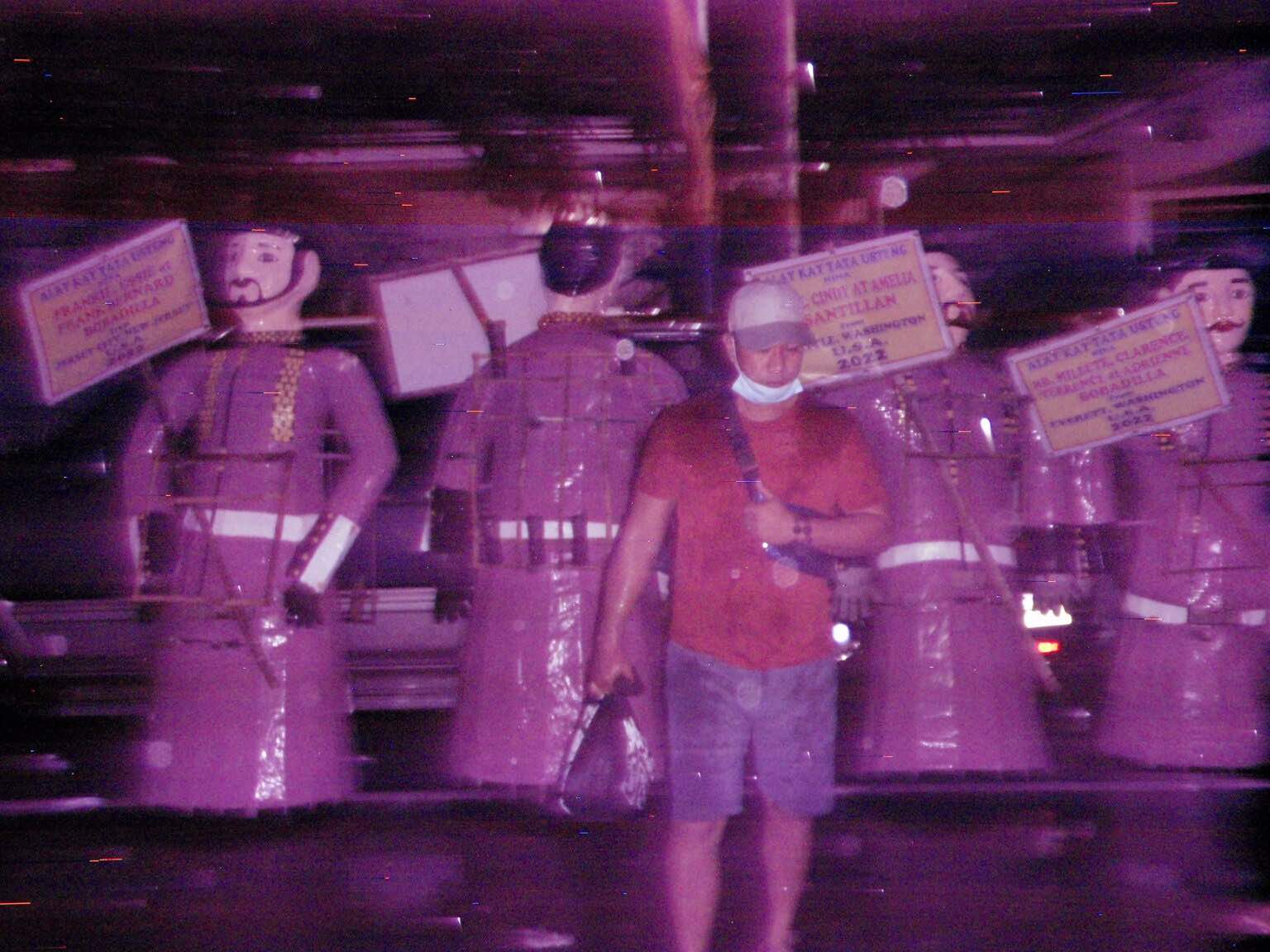
A moment captured by Jayvee during the feast of Tata Usteng in Tanza, Cavite, his hometown. “Man with higantes. I was strolling around town while it was raining—an auspicious sign from the saint—when I noticed this guy standing next to the higantes meant for the celebration,” he shared.
How do you view nostalgia?
Author Milan Kundera said something like, “nostalgia is the suffering caused by an unappeased yearning to return.” That really resonated with me. Don’t we all just want to go back to simpler times?
Elly, 25
Our generation has tons of options when it comes to taking pictures and videos. With the latest models of cameras and phones, everything can be instant and high-quality. But what made you backtrack and shift to this gadget?
I shifted to this tool because of its price and accessibility. I can now finally shoot the crowd and the bands I document in an affordable way! I bought one because of its wide lens. I had to research what fit me before purchasing. I missed the experience of taking photos just for fun, simplicity, and comfort and this tool provided me with that warmth.
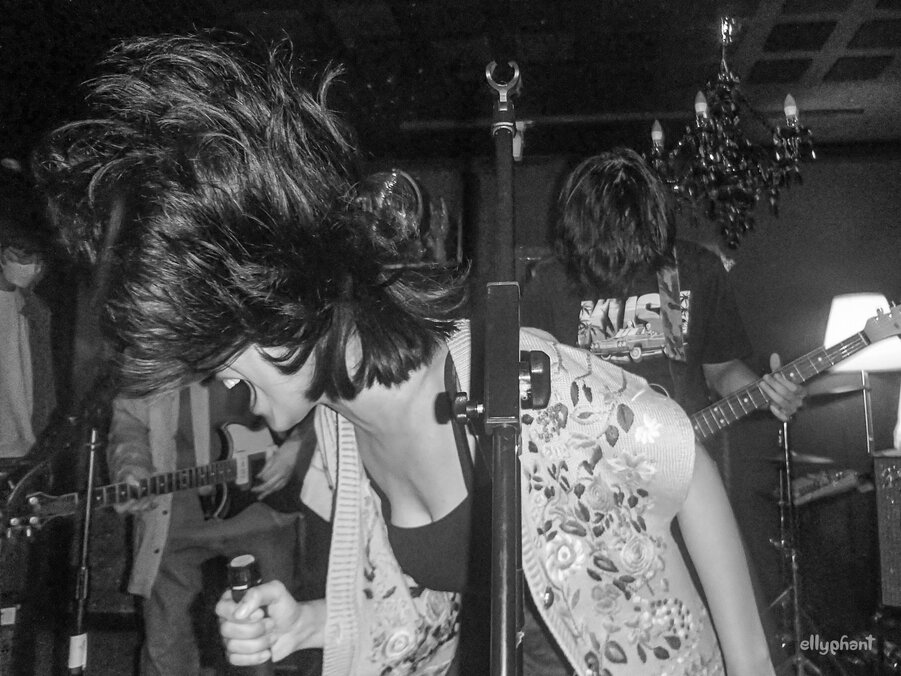
A photo Elly took for local band Goon Lagoon at Flying Lugaw’s “Radiohead Night” in 2022. She said, “The band really liked the photo to the point that it became their latest EP cover. Support the band by listening to them or going to their shows! I was really honored and touched.”
My main camera [has been] a Canon 70D for almost a decade, but my dream zoom/wide lens (an 18-35mm 1.8 Sigma Art) is still expensive. I also wanted to upgrade to a new body, but I don’t think it’s reasonable to buy yet as I’m the breadwinner for my family. I was also thinking about the inflation costs, so this pushed me to research cheaper versions of cameras that I can shoot with and take with me everywhere I go without the huge baggage.
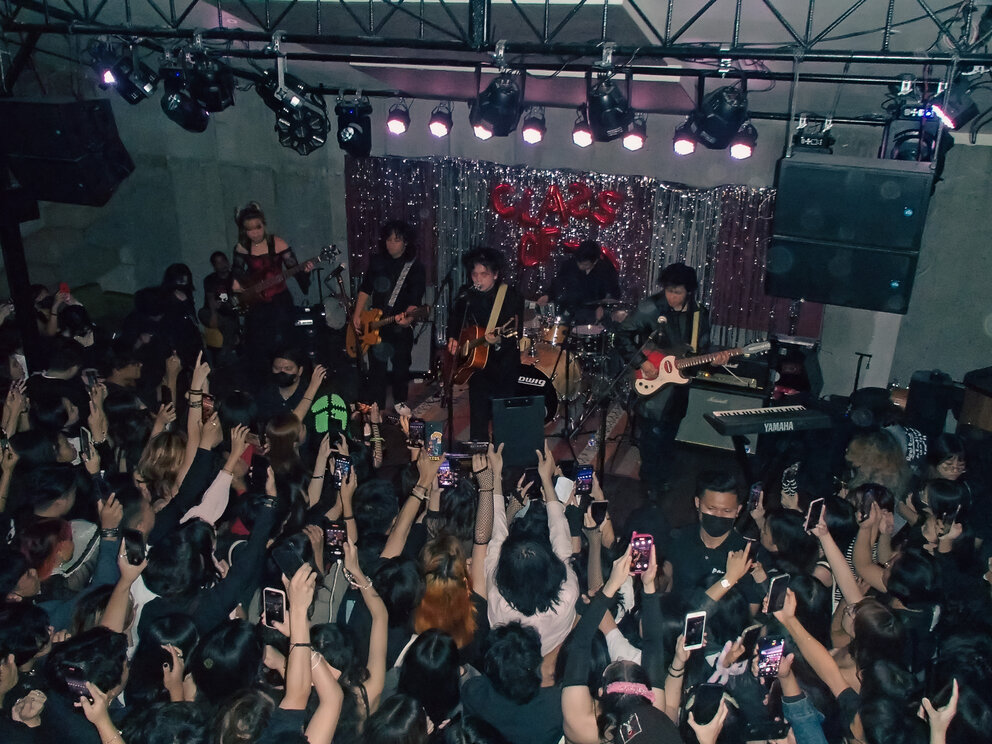
Photos Elly took during Black Prom Night last March: “The first photo was a picture of Zild, Tim, and Ena before the gig started. Zild asked me to take a photo of them after I told them a message that the gig will start when the DJ started playing ‘T.L. Ako Sayo.’ The second pic was the whole crowd of the gig inside the Balcony Music House.”
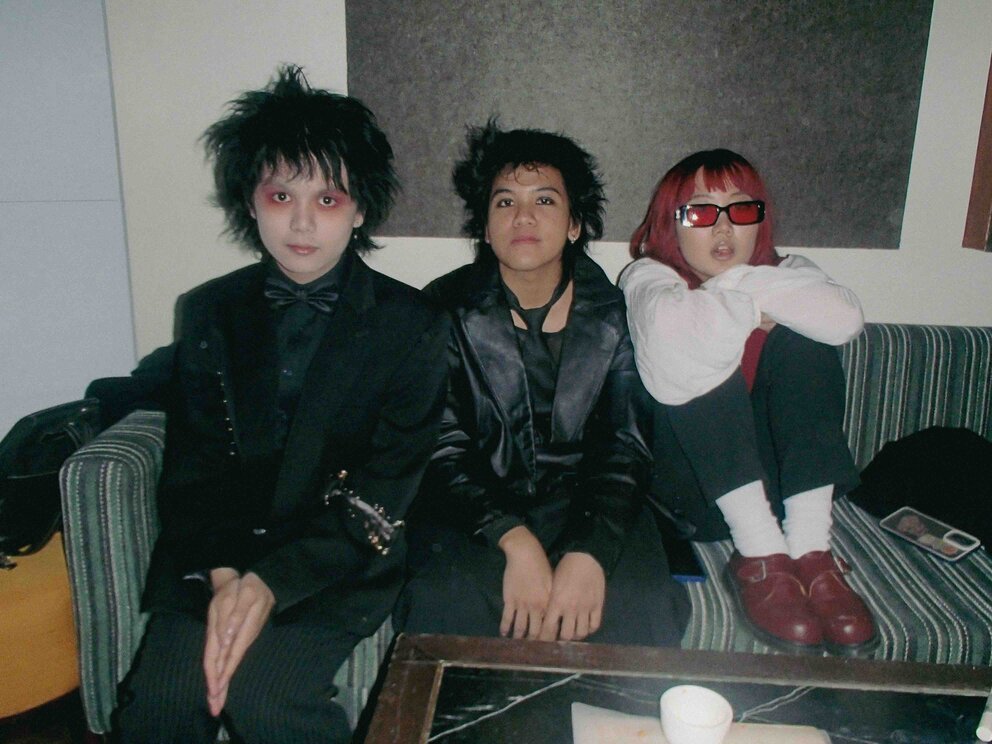
Photos Elly took during Black Prom Night last March: “The first photo was a picture of Zild, Tim, and Ena before the gig started. Zild asked me to take a photo of them after I told them a message that the gig will start when the DJ started playing ‘T.L. Ako Sayo.’ The second pic was the whole crowd of the gig inside the Balcony Music House.”
What do you love most about using this gadget? What makes this a different experience versus when you’d use newer devices to take photos and videos?
I love using my Olympus digicam because of its convenience and discreetness. It’s also very flexible since it’s a sports type—I can shoot underwater, or in the snow! Whenever I take photos of the crowd it has this fast shutter/flash compared to other older digicams our family used to have.
I prefer this camera for taking photos of the event crowd, and the whole shot of the setup of the artists/bands, because of its wide lens. The lens doesn’t even protrude and even if I drop it; it’s still intact. I dropped it countless times during extreme mosh pits and it’s still not damaged. It’s like the Nokia 3310 of digicams for me (laughs). Honestly, I really wanted to have this camera back in the day but it was super expensive and now, I got it for super cheap. The photo below is me doing crowd control during Paniki Nights vol. 3 while taking photos with my digicam!
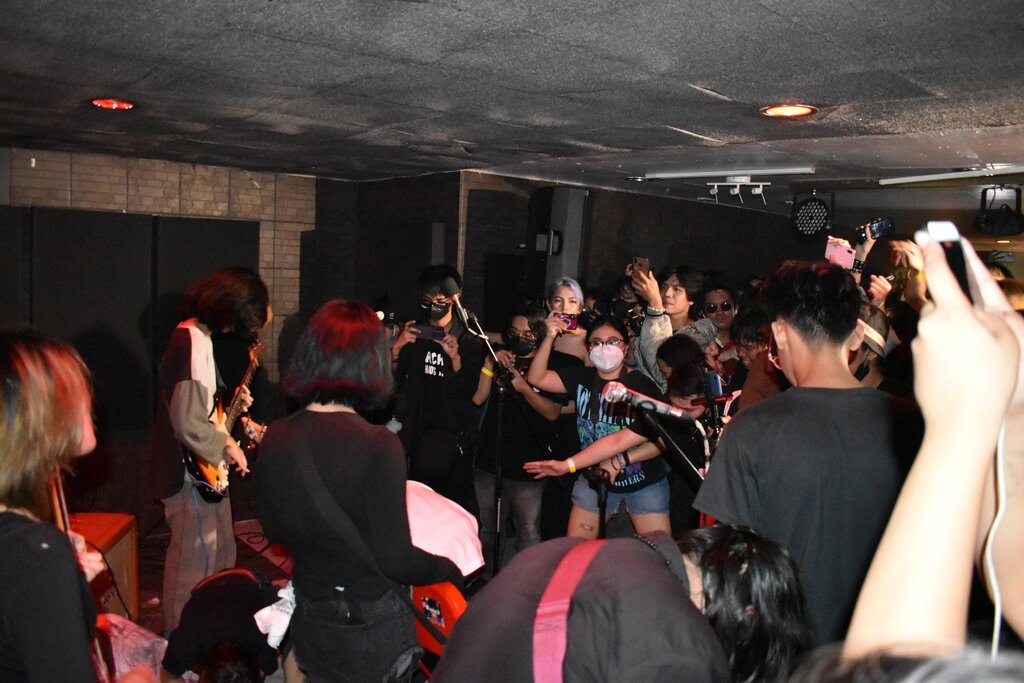
Photo by Sherwin Fiel
How did your relationship with photography change after using this gadget?
I learned to appreciate that it’s not how expensive your camera should be. It’s about preserving the history that one can go back to for research or archiving.
Do you consider yourself chronically online? How do you think this connects with your use of gadgets?
I consider myself 50/50 chronically online. I still need to touch some grass and go outside and take a breather at times. Without me being online, I will not be able to find what digicam I currently use now. Thanks to Carousell/FB Marketplace for strengthening the 2nd hand items market. My usage of the internet connects me with all the free information that I can learn on how to improve in using my current tools.
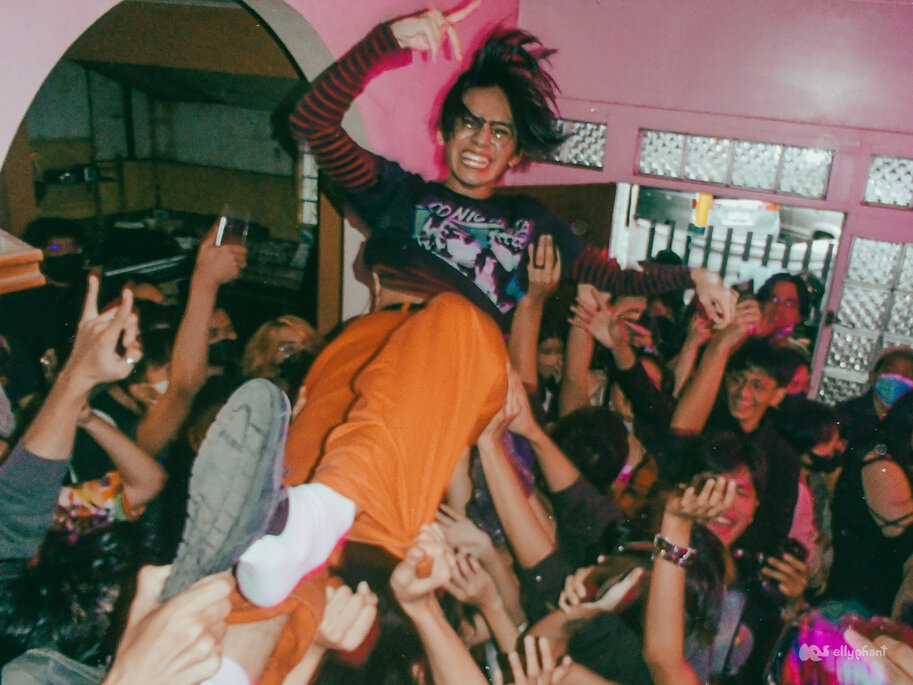
A photo Elly took during Paniki Prod’s Bhie Got 10 in Sining Shelter. She recounts, “[This photo features] one of the show’s patrons named James who crowdsurfed during MATOKI’s set. The funny thing in this photo is that his shoe was getting removed by one of his fellow showgoers. This was my favorite in the set I took that day.”
I view nostalgia as a bittersweet experience; for one, I do think that it’s harmless to look back at the things you’re very fond of when you were way younger, but at the same time, you get to become really bitter that none of it exists anymore. It only exists in immortalized moments in the digital realm: really dusty, Flickr compilations, grainy YouTube videos, Photobucket albums of really old local bands, and the stories of your friends who happen to have similar experiences in Discord servers anywhere.
Nostalgia has always benefitted from companies who wanted to sell it as “nostalgia” primarily and not for its features that have extended its longevity over the past decade or so. And when I look at digicam photos, I don’t romanticize its quasi-“retro-looking” visual aesthetics, but just in general, digicams are used for everyone in the industry and everyday life. Taking photos using digicams reminds me of that Ratatouille quote, “Anyone can cook” but repurposing it instead to, “Anyone can take photos.”
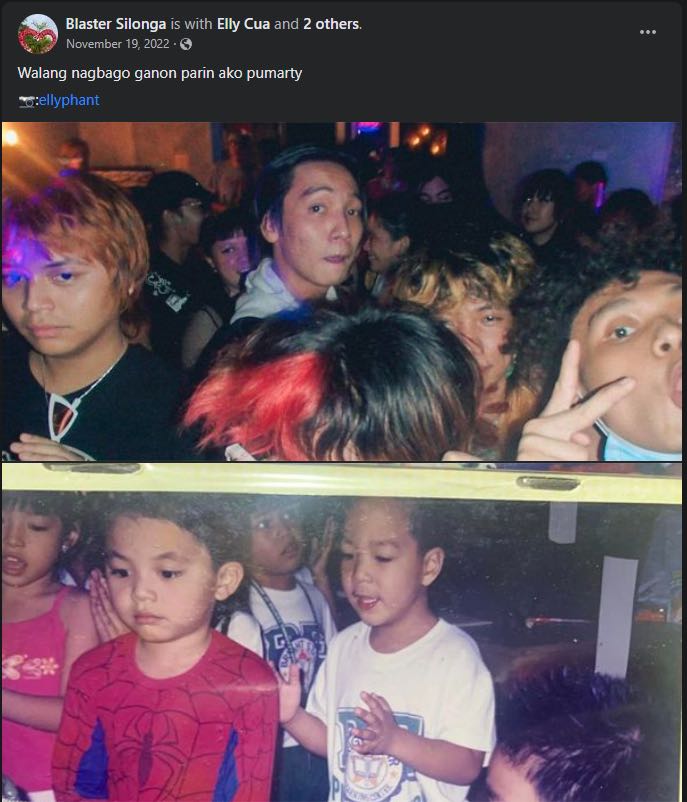
During “Dance Yourself Clean” by Nomad Satellite Disco, Elly was able to capture Blaster Silonga in the audience “looking serious around people who were having fun.” The musician then reposted it alongside an old photo with the same energy.
Joaquin, 25
Our generation has tons of options when it comes to taking pictures and videos. With the latest models of cameras and phones, everything can be instant and high-quality. But what made you backtrack and shift to this gadget?
I definitely always wanted one [because] of artists using them in music videos and old skate videos. It just looked so cool. I thought it would be unrealistic to actually get one, ’cause I didn’t remember ever seeing one in person till then. When I first started, I gravitated towards this medium out of necessity. I wanted a different look to my documentation and I didn’t wanna ask my parents for a decent modern camera. I liked how it looked so I thought I might as well stick with it. Today I still use my camcorder because it just feels right.
View this post on Instagram
Joaquin shot the behind-of-scenes of LONER’s “If Only” music video. “I was an extra and I decided to shoot some BTS clips for fun. I was really shy, but everyone was really nice and fun to hangout with. Aesthetically I always wanted to shoot something like this, abandoned house and all. The style of the video was very ’90s-inspired so it made sense to capture it with my camcorder. Some of my clips ended up being in the official music video which was cool. I wish I could’ve filmed more but my battery died on me.”
What do you love most about using this gadget? What makes this a different experience versus when you’d use newer devices to take photos and videos?
Everything that makes it obsolete I find attractive. I also think it’s cool how I’m keeping mine alive ’cause there won’t ever be any new camcorders like these. I love it even though [it definitely involves] a slower process, [is] less convenient, and I’m scared it’ll break. But for me, it’s actually not that much different than using newer devices once you get used to it; it’s a fully capable camera to help capture one’s vision.
How did your relationship with photography/videography change after using this gadget?
The limitations of my camcorder made me want to make the most out of it, and become better at my craft. It also made me want to shoot more in general.
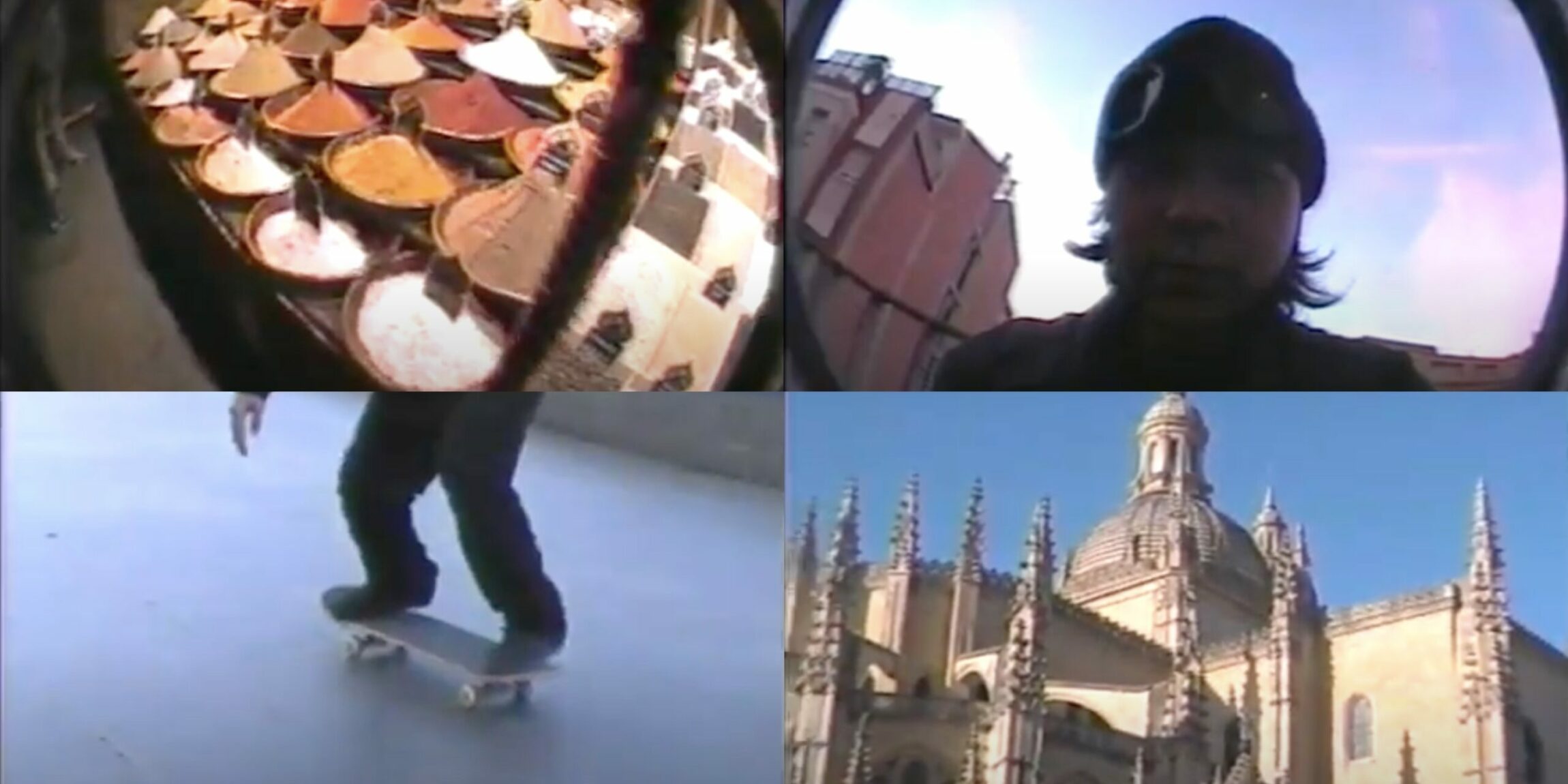
Stills from another documented family trip by Joaquin, which he calls “Still Life.” He said, “I was fortunate enough to go to Spain with my family last December. I had a lot of fun documenting the mundanity of a place that was new to me. Everything from the architecture, food and atmosphere was just so different from what I was used to. The people in Spain are very welcoming and lively. It’s honestly quite contagious.”
Do you consider yourself chronically online? How do you think this connects with your use of gadgets?
Yes (laughs), but I’m not a fan of social media at the moment. I’m mostly on Youtube or playing video games. I guess there’s a parallel to be found between using slower gadgets like this and being mostly hands off (on the instantaneousness) social media.

Stills from Joaquin’s “Cranberry Alchemy”: “I scraped together some memories of late pandemic 2020. I can feel the angst of that time period through the screen. Looking back now makes me realize that this was so long ago. It also features some of the best skating I’ve ever captured.”
How do you view nostalgia?
I love nostalgia. It’s such a human quirk. I think it’s important to be looking at the present and future, but nostalgia is such a satisfying feeling. It reminds me of the life I’ve lived so far.
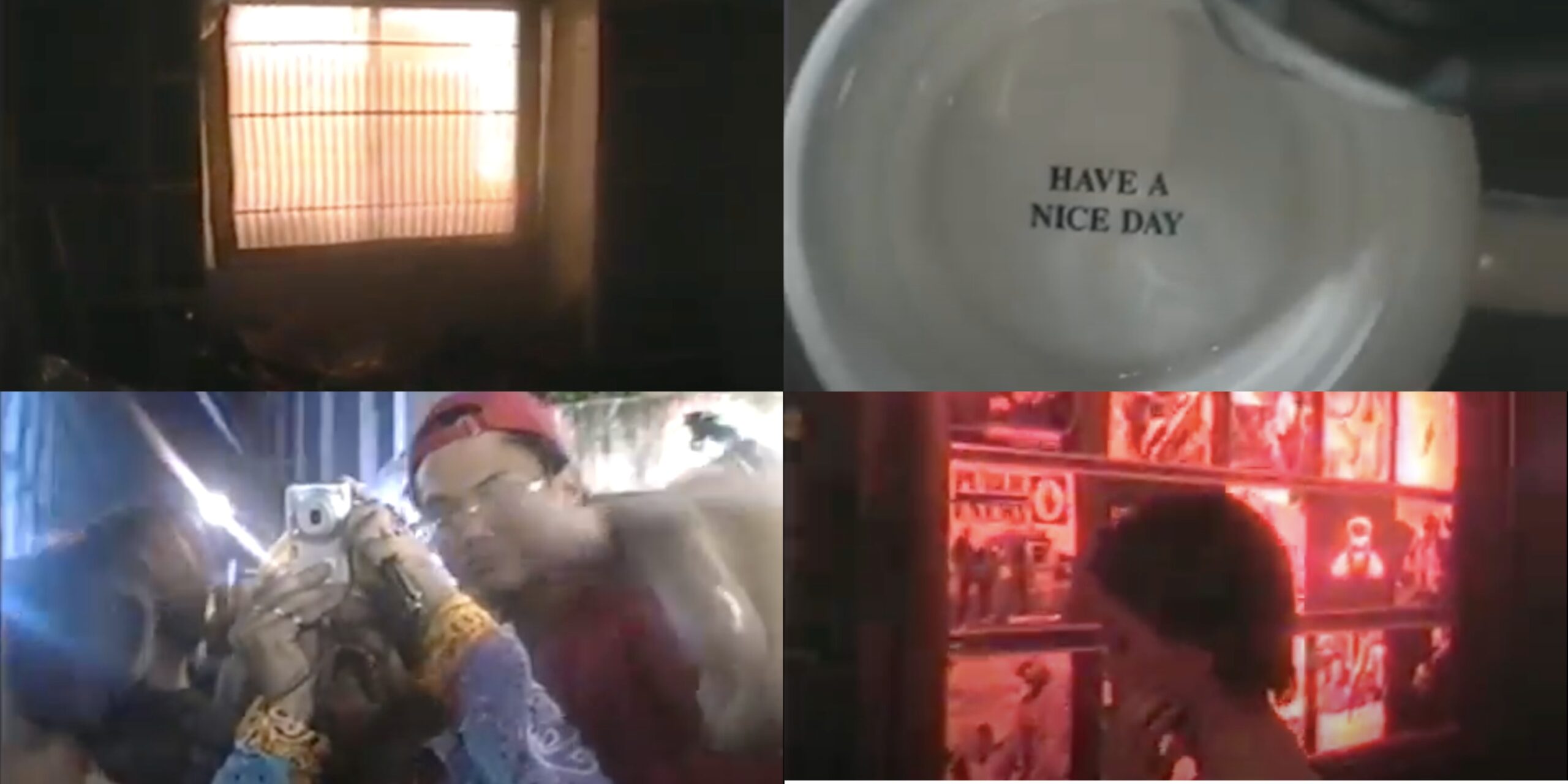
Stills from a “Day In My Life” video by Joaquin. “I think this is my second edit with my camcorder. What an eventful and spontaneous day. It features footage from Escolta Block Party 2018. I was still in college at the time, so watching this reminds me how I was so free back then and had a lot less responsibilities.”
Emilia, 19
Our generation has tons of options when it comes to taking pictures and videos. With the latest models of cameras and phones, everything can be instant and high-quality. But what made you backtrack and shift to this gadget?
The film camera, camcorder, or digital camera quickly became a staple in my high school life. One [of my influences] was being surrounded by family members that shot a lot of film and had a collection of vintage cameras. It fascinated me to see cameras that expanded like the folds of an accordion, or ones [with] film [that were] not even being made anymore. I existed on rolls of film even before I entirely knew what film was, but once I did, I was hooked and it just grew from there.
I buy and use vintage cameras for the experience it gives whilst using it. The way you forget about the moments you took photos of, and the funny feeling it gives when you get a film roll developed then realize all your photos are ones you cannot post because you no longer talk to those people… And how the camcorder makes me feel like I’m in an episode of “The Office.” It is something that cannot be replicated by an app on the phone. Other than the experience, I think vintage cameras are so romantic.
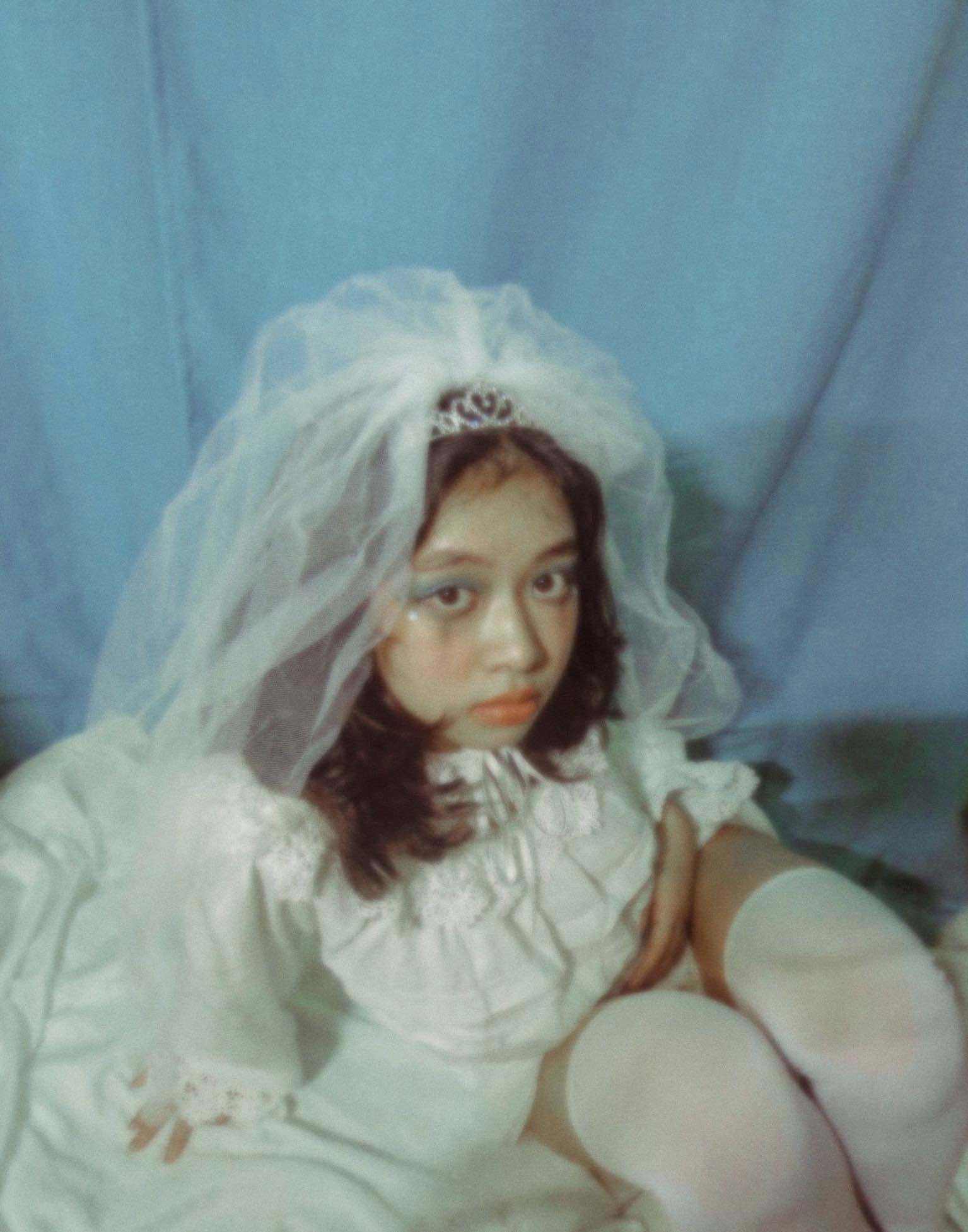
One of Emilia’s digicam portraits: “I love taking weird little photos! In one, I am dressed as a bride and the other I wore a nun costume in [a fast food chain]. Digicams make photos look so raw which is why they’re great for random moments like this. I usually use them when I just want to have fun!”
The fact that it’s not a phone; it feels like something made solely for the purpose of capturing memories.
How did your relationship with photography change after using these gadgets?
Once I started using vintage cameras, I couldn’t go back to just using my phone to capture photos and videos. The quality and the colors the photos or videos I would take somehow made me romanticize my life more and give meaning to moments that I didn’t know would mean so much in the moment. The way that some of them are kinda blurry and not perfect makes me think harder about what happened that day. I wanted my photography to have personality even without being processed, which is exactly what vintage cameras gave me.
A short film Emilia made using her camcorder: “I wanted to make a weird and experimental short film using my camcorder and a green screen. I remember I found a video from the 1950s or 1960s and decided to use it as a voice-over. Love this video so much.”
Do you consider yourself chronically online? How do you think this connects with your use of gadgets?
Being a teenager that lives in a world dependent on social media, it’s hard not to have that dependency yourself. I was addicted to my phone for so long, so I think I am chronically online to a certain level—at this point, it’s kind of unavoidable.
Because of this, my cameras allow me to be more present. It’s just me taking photos and videos using a device made for that, rather than a phone where I’d probably be tempted to use all my other apps and be preoccupied to post the photo I took on my story or filming a TikTok—none of which are bad, but I’d rather not look back on my memories and only remember only me being on my phone the whole time.
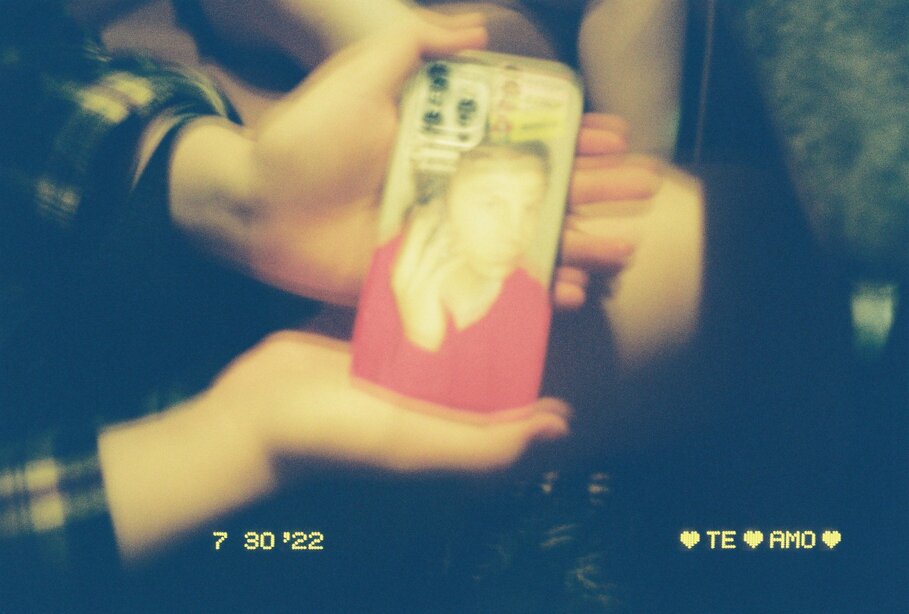
Aside from digicams and camcorders, Emilia also likes freezing moments through film. “I love Michael Cera and I got a custom phone case of him. I remember planning this photo out so much, because I wanted to show off my phone case, but it ended up turning blurry. Nonetheless, I love this photo,” she said.
How do you view nostalgia?
Nostalgia makes me believe that things were better than how they actually were, but I fall for it every time. That the people in those film photos or video compilations weren’t that bad—[but] deep down, I know they were. The vintage cameras for a brief moment makes me forget about the bad things, isolating the exact moment I shot it on my camera. Like the vintage cameras, I believe that nostalgia is romantic.
Read more:
Take a shot at analog photography through these 7 Instagram shops
This film photographer caught Magic Ball’s most intimate moments
Your next budol? Cute film cameras. Just head to these IG stores
Art by Ashley Valdenarro
Photos from Jayvee del Rosario, Elly Cua, Joaquin Daza Dimayuga, and Emilia Evangelista
Check out more of Jayvee’s work on Instagram; Elly’s work on Instagram, Facebook, Twitter, and her online portfolio; Joaquin’s work on Instagram; and Emilia’s work on Instagram.
























Comments